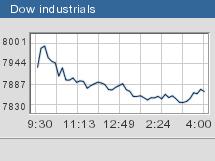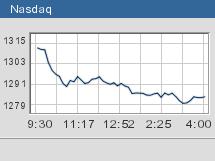NEW YORK (CNN/Money) -
Investors likely will look to a report by U.N. Chief Weapons Inspector Hans Blix in addition to some corporate earnings and economic data for direction next week, after pulling back for four consecutive weeks on geopolitical tensions.
After starting higher Friday, led by a surprise drop in the unemployment rate and a jump in non-farm payrolls, stocks lost gains after the government raised the terrorist attack threat level to "high risk," the second highest rating.
"The markets should have held on to gains after the jobs report," said James Park, senior vice president at Brean Murray & Co. "What we're seeing is definitely a reaction to the terror threat level being raised."

The Dow Jones industrial average (down 65.07 to 7864.23, Charts) fell 0.82 percent Friday, while the Standard & Poor's 500 index (down 8.46 to 829.69, Charts) dropped 1 percent. The tech-laden Nasdaq composite (down 19.26 to 1282.47, Charts) logged the greatest decline, at 1.5 percent.
All three indexes chalked up losses for the week. The Dow slipped 189 points from Monday's start, while the Nasdaq dipped 38 points. The S&P lost 26 points on the week. Despite some gains in the first two weeks of the year, the Dow and S&P have lost 5.7 percent of their value since 2003 began. Meanwhile, the Nasdaq has fallen 4 percent.
U.S. government officials said they raised the national terror threat level to high risk, or orange, from an elevated risk, or yellow. The national threat levels are part of a color-coded system that was developed following the attacks on Sept. 11, 2001. Go to CNN.com for more.
Some traders said the last hour of the session was quiet, as some brokers left work early after New York Governor George Pataki and New York City Mayor Michael Bloomberg discussed the impact of the increased threat level on New York City.
President Bush and British Prime Minister Tony Blair both issued statements saying essentially time is running out for Iraq to disarm and the United Nations should take stronger action. The comments come as the two nations are attempting to gain support from Security Council members to pass a U.N. resolution backing war.
Bush said he would welcome a second United Nations resolution on the situation in Iraq. He said the "game of deception" Iraqi President Saddam Hussein has been playing with U.N. weapons inspectors is over.
Meanwhile, Blair said Britain is prepared to go to war with Iraq without the backing of the U.N. Security Council in the case of an "irresponsible veto." Permanent Council members Russia and France, which have expressed their desires to allow more time for inspections, do have the power to veto a majority vote. For the latest developments, click here.
Some traders said the market had already priced in a short war with few casualties, so it was unlikely the markets would rally if that were the outcome.
"It's unlikely the market would get a boost from that kind of a result," said Brett Gallagher, head of U.S. equities at Julius Baer. "This time we have such a good outcome priced in that I don't think we'll have a huge rally once this is over."
But, whether the markets will see a change in sentiment next week has yet to be seen.
Investors likely will look to a speech by Hans Blix to the U.N. Security Council Friday, in which he plans to outline the findings of the weapons inspectors in Iraq and whether he thinks the Iraqis have been complying with those inspections.
Also of note: Federal Reserve Chairman Alan Greenspan plans to testify to Congress on the state of the economy.
In economic news, reports on retail sales and industrial production, both expected to gain 0.2 percent by a consensus of economists survey by Briefing.com, will likely turn investors heads. In addition, the University of Michigan releases its initial take on consumer sentiment for February.
In corporate news, Dow component Coca-Cola (KO: down $0.38 to $39.53, Research, Estimates) and tech heavyweight Dell Computer (DELL: down $0.68 to $23.34, Research, Estimates) report quarterly fiscal results next week.
Jobs report surprises
A surprisingly positive jobs report gave an early boost to stocks before they lost hold of their gains.

The Labor Department said the unemployment rate slipped to 5.7 percent in January, well below economists' forecast that it would hold at 6 percent in line with December, according to a Briefing.com survey. The report also showed a rise of 143,000 new jobs in January after a revised loss of 156,000 jobs the prior month. The number of new jobs more than doubled the expected gain by economists.
Some traders said the reading might not indicate as strong growth as it seems, as 101, 000 of the new jobs came from the retail sector -- which could be a result of less hiring than usual for the holiday season and, therefore, fewer layoffs in January.
Separately, the Commerce Department said wholesale inventories rose 0.8 percent, following a 0.3 percent gain in November, logging the biggest rise since June 2000. The job was significantly greater than Wall Street's expected 0.2 percent rise, according to Briefing.com.
Investors get mixed corporate news
The Wall Street Journal said Dow component Johnson & Johnson (JNJ: down $0.28 to $51.84, Research, Estimates) is in advanced talks to acquire biotech developer Scios (SCIO: up $7.51 to $42.20, Research, Estimates) for about $2 billion. Scios said it also is in discussions with some other life sciences companies about merger possibilities.
Meanwhile, PC leader Dell Computer (DELL: down $0.68 to $23.34, Research, Estimates) and computer services firm Electronic Data Services (EDS: up $0.78 to $16.49, Research, Estimates) both issued discouraging forward-looking comments about technology spending.
Dell said Thursday corporate spending on technology will be soft this year due to the weak economy and concerns about a potential U.S.-led war with Iraq.
EDS, the No. 2 computer services firm, posted lower quarterly earnings and warned its first-quarter and 2003 profit will miss estimates.
Animation studio Pixar (PIXR: down $2.66 to $51.76, Research, Estimates) reported fourth-quarter earnings that beat expectations after the close Thursday, but warned first-quarter and 2003 results will be far below current estimates.
Asian-Pacific stocks finished mostly lower, as companies in Tokyo appeared to be preparing for the finish of the fiscal year at the end of next month, by unwinding mutually held shares. South Korean stocks fell to their lowest level since fall 2001 as North Korean concerns continued to weigh.
European markets mostly fell, weighed by Deutsche Bank, which reported a quarterly loss that fell below market expectations.
In key commodities markets, light crude oil for March delivery gained 96 cents to $35.12 a barrel. Gold fell 20 cents to $370.50 for April delivery.
Treasury prices rose late in the day, with the 10-year note yielding 3.93 percent, down from 3.94 percent late Thursday. The dollar gained ground against the yen and was little change versus the euro.
Market breadth was negative. On the New York Stock Exchange, decliners beat advancers by nearly 2 to 1 as 1.2 million shares traded. On the Nasdaq, losers beat winners about 2 to 1 as 1.2 million shares changed hands.

|

